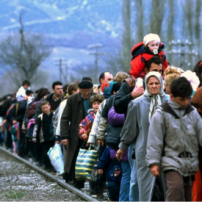
Deportation of an applicant for asylum and the threat of imprisonment due to homosexual acts
JUDGMENT
I.K. v. Switzerland 18.01.2018 (no. 21417/17)
SUMMARY
Application for asylum from a Sierra Leonean citizen. Rejection of the application and deportation of the applicant. Claims that in case of expulsion he will be subject to a prison sentence due to his homosexuality. No violation of Article 3 (prohibition of inhuman and degrading treatment), because the law on the prohibition of relations between men in the country of expulsion had not been applied in practice. The action is dismissed as manifestly unfounded.
PROVISION
Article 3
PRINCIPAL FACTS
The applicant, I.K., is a Sierra Leonean national who was born in 1988 and lives in Heiligkreuz.
I.K. entered Switzerland on 11 November 2012 and applied for asylum. The Federal Migration Office (now the State Secretariat for Migration (SEM)) interviewed him twice on his grounds for seeking asylum.
By a decision of 1 April 2014, the SEM rejected I.K.’s asylum request and held that he was to be removed from Switzerland; it considered that his allegations lacked credibility and that his submissions about his homosexuality were not persuasive. The SEM also noted that his allegations about his activities within an LGBTI organisation in Sierra Leone were stereotyped and artificial. The SEM further considered that, even supposing that I.K. was homosexual, this fact did not automatically entail persecution, given that the law prohibiting homosexual acts between males, still in force in Sierra Leone, was not applied in practice. Lastly, the SEM indicated that, without the arrest warrant mentioned by I.K., there was also nothing to indicate that criminal proceedings had been opened against him.
On 28 April 2014 I.K. appealed against that decision to the Federal Administrative Court (TAF). The TAF dismissed his appeal, holding that I.K.’s allegations concerning a risk of persecution were implausible and that there was no objective evidence to support them. The TAF found that it was highly improbable that a prison sentence would be imposed on I.K. in Sierra Leone for homosexual acts. It concluded that his submissions with regard to alleged persecution were not credible and that his fear of being arrested and persecuted in his country of origin was not realistic. The TAF concluded that there was thus nothing to prevent I.K. from being returned to Sierra Leone and that this measure would not be in breach of Article 3 of the European Convention on Human Rights.
THE DECISION OF THE COURT
Article 3
The Court considered that sexual orientation was a fundamental facet of an individual’s identity and awareness and that, in consequence, individuals submitting a request for international protection based on their sexual orientation could not be required to hide it.
The Court noted, however, that the merits of I.K.’s case had been examined by the SEM and by the TAF. Both had found that his statements failed to meet the requirements of plausibility, and that the documents that he had produced were not such as to call into question that finding. In consequence, they had considered that I.K. would not run a real risk of treatment contrary to Article 3 in the event of his being returned to Sierra Leone.
The Court was mindful of the difficulties faced by I.K. in substantiating his allegations. Nonetheless, it considered that he had not adduced sufficient evidence capable of proving that he would be exposed to a real risk. Thus, he had not submitted documents proving his alleged imprisonment following a demonstration in support of homosexuals’ right to marriage or the payment of bail for his release. The document “Invitation form, family support unit” produced by him in support of his appeal before the TAF contained numerous inconsistencies, particularly with regard to dates, which had been identified by the TAF. The Court further noted that I.K. had been unable to substantiate his alleged LGBTI activism. Lastly, the NGO Queeramnesty had merely copied his account, without recounting any event which one of its members had personally witnessed.
The Court concluded that there were not substantial grounds to believe that the applicant would be exposed to real risks of treatment contrary to Article 3 in the event of his return to Sierra Leone. It did not consider it necessary to carry out a separate examination under Article 14.
The application was manifestly ill-founded and had therefore to be rejected(echrcaselaw.com editing).


